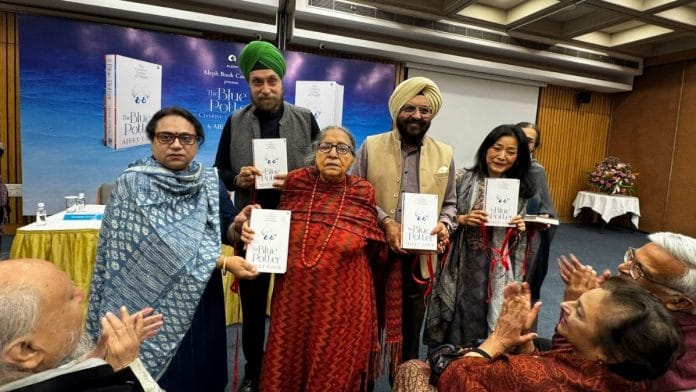New Delhi: Author Ajeet Cour often felt intimidated by Khushwant Singh’s wife, Kawal Malik. At gatherings in the Singh household, they only served vodka, whiskey, and peanuts. No elaborate dishes. And the moment the clock struck 8:30, Kawal would clap her hands and announce that it was time for everyone to leave.
“These were a few lines from the portrait of Kushwant Singh by Ajeet Cour. When I read her sketches, it felt like I was standing in a village courtyard listening to men and women whose voices had long been silenced,” said translator Sushminder Jeet Kaur, as she read out some pages to the audience at the India International Centre.
It was Cour’s 91st birthday on 16 November, celebrated with the launch of her new book, The Blue Potter: The Creative Genius of Punjab. Readers young and old had come to hear about the Padma Shri awardee’s new work.
The Blue Potter offers an intimate portrait of Punjab’s 17 iconic personalities who have shaped India’s social, political, cultural, and literary fabric.
From the lesser-known world of Amrita Pritam to Khushwant Singh to poet-politician VP Singh to Shiv Kumar Batalvi and the legendary Jagjit Singh, Cour’s stories reveal the hidden facets of their personalities.
“Such portraits are not easy to write. These are not the kind of sketches you can complete in a two or three-hour sitting. They are deep portrayals of the relationships that each legend had with Cour, or with the world of letters and politics,” said Navtej Sarna, former Ambassador of India to the United States, who was one of the speakers at the event.
Sarna was joined by Rawail Singh, author and Punjabi professor at Delhi University and Kaur, who translated The Blue Potter.
How Kaur became Cour
Cour’s literary journey is, in a way, hidden in her surname. While studying at Sacred Heart School, a linguistics teacher once spoke about the difference between the letters K and C. “K,” the teacher said, “represents something harsher, more masculine, while C is soft and feminine.”
“And that’s when I removed the K from Kaur and replaced it with the feminine C,” Cour said in a documentary shown at the event.
For Cour, who could barely walk without support, speaking was a challenge. The event opened with the documentary, offering attendees a glimpse into her life.
Born in Lahore in 1943, Cour migrated to Delhi in 1947. She was witness to major historical events, from the Partition to Operation Blue Star in Punjab. Her literature—including her latest book—offers glimpses of these events. She has authored 21 books and is known as a powerful voice in Punjabi literature.
“Humans are resilient. Even when uprooted, they can regenerate roots. They can move mountains,” Cour said in the documentary.
Also read: Mamdani to Muzaffarnagar, Rajmohan Gandhi links ‘Dastan-e-Nehru’ to the present
‘Want to write Cour’s biography’
For Sushminder Jeet Kaur, translating Cour’s book was a dream come true. Her work went beyond literal translation; she also spent time with Cour to capture the depth of her personality.
“Each portrait has been written with such tenderness that one forgets where life ends and art begins,” Kaur said.
The two-hour-long event saw Cour’s readers and friends walking up to her seat to seek blessings. Even in cases where she couldn’t immediately recognise a person, she would gently touch their face and hands, and then suddenly utter their name. The author was joined by painter and graphic artist Arpana Caur.
Through the laughs that followed the speakers’ revelations about the inner world of Punjabi personalities, and the claps from the audience, Cour looked around and smiled at everyone.
Rawail Singh, who spoke in Punjabi, said that the book inspired him to write a biography of Cour. “I want to know about the intimate world of Cour, who is known for her resilience and straightforwardness,” he added with a laugh.
(Edited by Prasanna Bachchhav)






